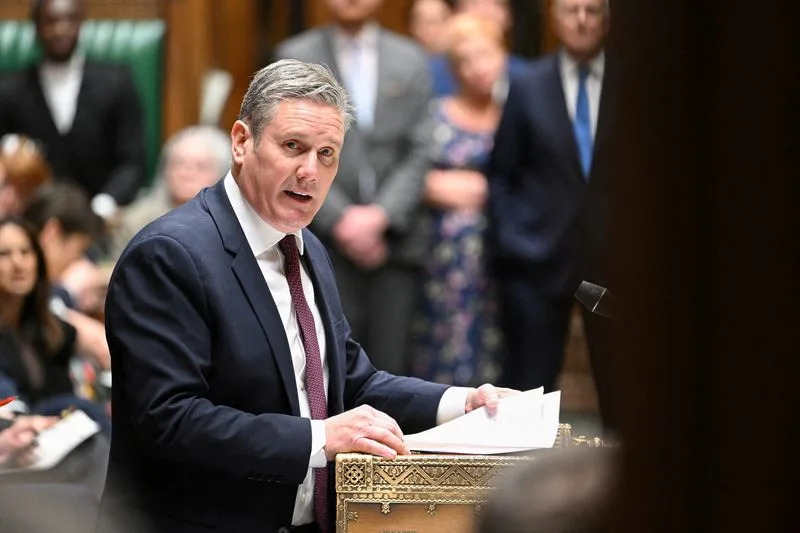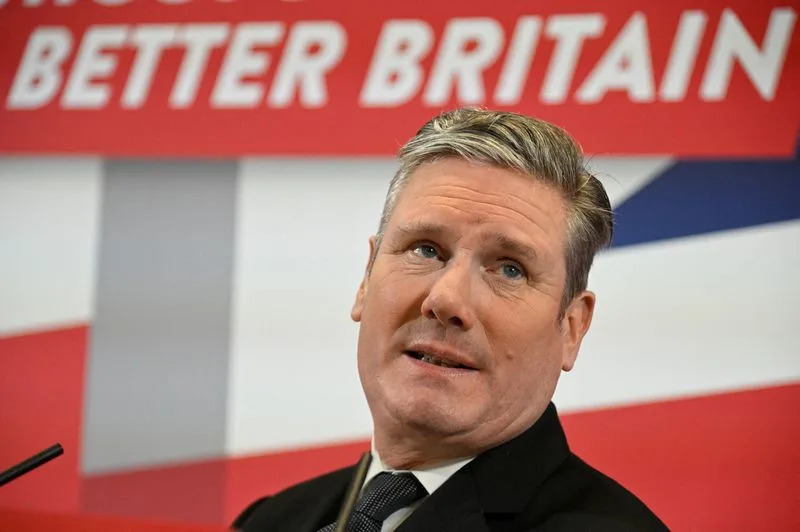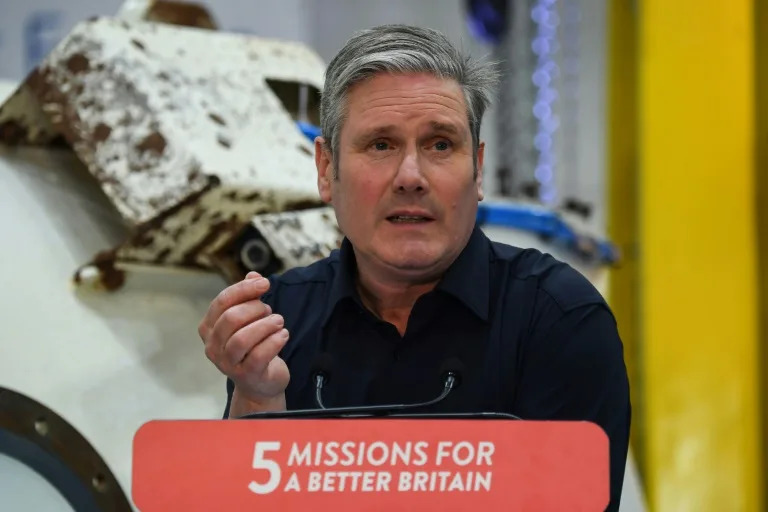Wed, 4 October 2023


Leader of the Labour Party Keir Starmer speaks at an event in London
By Elizabeth Piper
LONDON (Reuters) - On June 7, a group of star-struck British lawmakers posted selfies with Kiss bassist Gene Simmons when the glam rocker visited parliament. Hours later, those from the opposition Labour party were summoned by senior members in charge of discipline and ordered to delete the posts and apologise.
In 2004, Simmons had been heavily criticised for calling Islam a "vile culture" and the Labour MPs were sent on their way with warnings about any posts or comments that strayed from Labour's line ringing in their ears, two told Reuters.
Welcome to Keir Starmer's Labour Party.
After Labour's worst defeat for 84 years in 2019 under left-wing veteran Jeremy Corbyn, Starmer - a human rights lawyer who became Britain's top prosecutor before turning to politics in his 50s - has instilled a culture of discipline in what was a deeply fractured party.
Taking lessons from centre-left parties in Australia and Germany, he has imbued Labour with a cautious and methodical approach in the race to be prime minister, hoping competence and pragmatism rather than any overriding ideology will be enough to oust the Conservatives, in power since 2010.
Ten people who have worked, studied or socialised with Starmer, 61, told Reuters he would press on with his systematic approach if he becomes prime minister in an election expected next year. A vote must be held by the end of January, 2025.
"The next stage is where we've got to be even tougher, even more focused, even more disciplined," Starmer said about the run-up to the election in a conversation on stage with Tony Blair at the former Labour prime minister's institute in July.
While Starmer's approach has not won over all hearts and minds within Labour, the party has a healthy 15-20 point lead in the polls and he remains ahead of Conservative Prime Minister Rishi Sunak in the personality stakes.
"Thanks to Keir Starmer's leadership, voters see a changed Labour Party that is ready to change the country with a mission-driven government," a Labour spokesperson said when asked to comment for this story. "Everything we offer will be built on a bedrock of economic stability and a plan for growth."
'CORBYN WITHOUT THE MADNESS'
Named after the founder of the Labour Party, Keir Hardie, Starmer was brought up in a staunchly left-wing household.
As a barrister, he often defended underdogs and worked to get people off death row around the world. He became a Labour lawmaker in 2015 at the age of 52, a year after he received a knighthood for his services to law and criminal justice.
Five years on, he inherited the party after its worst election showing since 1935. Corbyn's plan to transform Britain with public sector pay rises, higher company taxes and sweeping nationalisation, fell flat with voters and the party was dogged by accusations of anti-Semitism and a fudged Brexit policy.
Starmer was seen "by many who supported Corbyn's policies as Corbyn without the madness", said his friend and Labour lord, Charlie Falconer.
According to Claire Ainsley, who was Starmer's executive director of policy in 2020-22 and now directs a new project on centre-left renewal at the U.S.-based Progressive Policy Institute, his advisers looked to Germany and Australia for lessons on how to turn things around.
Olaf Scholz was trailing badly in the polls when he was nominated as candidate for the centre-left SDP ahead of federal elections in 2021, after which he became chancellor. Australia's Anthony Albanese took over as leader of the Labor Party after it lost an election in 2019 and became prime minister in 2022.
Both changed their fortunes by focusing on a handful of commitments - Starmer has five missions - and running a disciplined campaign, Ainsley said. This was a strategy Starmer not only took on board, it also suited his talents.
Several of the people close to Starmer described him as more of a methodical lawyer than an ideological politician, and said this coloured his approach after becoming leader.
Falconer said Starmer embarked on a four-stage plan: first getting rid of alleged anti-Semitism within the party; putting the organisation back on its feet; bringing the best Labour lawmakers into his "shadow cabinet"; and finally adopting policies to address Britain's needs.
Ainsley said after tackling the factionalism, morale and finances of the party, Starmer's plan was then to argue why the Conservative government was not fit to govern and finally present his "positive offer" to the public.
"He has done it systematically always with an eye to the strategic, and doing it with enormous self-discipline," Falconer said.
STEP BY STEP
It's a strategy Starmer learnt when he became Director of Public Prosecutions (DPP) - essentially Britain's top prosecutor - in 2008, the people close to him said.
Then, he set goals for each of the years he had in front of him. The first involved travelling around the country to see how the different offices operated, then came reform, implementation and finally to prepare for his successor.
That was his instinct too when he became Labour leader but his plans were somewhat thwarted by COVID: his victory speech was delivered virtually from his living room.
Starmer later still went on his tour though, largely under the radar of television cameras, and would purposely talk to people who did not agree with Labour policies, Ainsley said.
"Corbyn would like to go to gatherings of the faithful. Keir does the opposite," she told Reuters.
Critics, especially those on the left of the party, complain this shows Starmer relies more on focus groups than ideology - and one shadow minister said they wondered whether he was bold enough to convince Britons to vote Labour.
Supporters say, however, it can only be an asset, describing him as someone of the left, as well as a pragmatist who assesses situations and draws conclusions.
For example, those on the left say Starmer has reneged on his leadership campaign pledges to uphold some of Corbyn's 2019 manifesto, such as the renationalisation of public utilities.
But Ainsley said he would have looked at the issue and decided "he is not convinced that the case for re-nationalisation in all cases at this particular point is there".
One person who worked with Starmer when he was advising the Policing Board to monitor the Police Service of Northern Ireland's compliance with the Human Rights Act said: "Everything he does, it's because he's thought carefully about what's going to get him to where he needs to be."
"He thinks about the best way to take people with him, or to take the people with him he needs to take with him."
'CHAMPION OF THE UNDERDOG'
It was while he was DPP that Starmer realised he had to become engaged in politics - and get into government - if he wanted to bring about real change, Falconer said.
But even after entering parliament, supporters and critics alike said he was still more of a lawyer than politician.
"As a lawyer you don't establish a coherent political position," said Falconer. "You have causes and his causes tended to be on the left. He was a real champion of the underdog and he was completely loyal to a series of causes."
Starmer often took on pro bono legal work, such as getting convicts off death row in the Caribbean. Working for free, he also played a key role in helping overturn the mandatory death penalty in Uganda, saving the lives of 417 people.
And working alongside lawyer Mark Stephens, they famously won an appeal in the European Court of Human Rights against the British government over the "McLibel" trial involving two environmentalists and fast-food chain McDonalds.
Now, his cause is getting Labour into power - and his pragmatism runs through his policy commitments.
With Britain's coffers all but empty, Starmer has issued a strong message to his top team: don't make any promises the party cannot prove can be funded.
Instead, they need to come up with ideas to make his five missions - economic growth, net zero, the health service, crime and education - work without increasing taxes.
That has led to courting business, as Blair did before the first of his three election victories in 1997.
Starmer's overreaching goal is to promote economic growth to try to increase tax receipts so Labour can help a public sector he says has been starved by years of Conservative austerity.
While cosying up to business is unpopular with the Labour left, people close to Starmer say even when he was a ring leader on the top deck of the bus to school, leading the laughter with other teenagers, there was a steeliness as well.
"He's clearly not worried about taking difficult decisions," said Andrew Cooper, who went to Reigate Grammar school near London with Starmer and was a former adviser to Conservative Prime Minister David Cameron.
Cooper said Starmer was famed at school, and often mocked, for his stubborn obsession with British rock band Status Quo - and never turned to the trendier sounds of new wave or punk.
"This is not somebody who craves to be liked."
(Editing by David Clarke)
Safety first? Labour seeks to maintain poll lead at annual meet
Peter HUTCHISON
Wed, 4 October 2023

Labour Party leader Keir Starmer announced his 'five missions' earlier this year (ANDY BUCHANAN)
Britain's Labour opposition gathers this weekend for its annual conference, with the centre-left party currently on course to return to power in a general election expected next year.
Labour, led by Keir Starmer, goes into the four-day event -- which starts on Sunday in Liverpool, northwest England -- well ahead of the governing Conservatives in opinion polls.
After this week's chaotic Tory conference, which hampered Prime Minister Rishi Sunak's bid to kick-start a resurgence of his beleaguered party, experts say the primary objective of Labour's meet is a simple one: do nothing that jeopardises its lead.
"The main thing will be don't cock up. No hostages to fortune, no signs of dissension," political scientist Anand Menon told AFP.
Labour last held the keys to 10 Downing Street in 2010 and is readying itself to govern again following a vote that must be held by January 2025 at the latest.
Starmer, 61, has revived the fortunes of a party that suffered a landslide defeat to the Conservatives at the last election in 2019 under former far-left leader Jeremy Corbyn, by pulling it back to the centre ground.
A recent European trip, including a meeting with French President Emmanuel Macron, was seen by many as Starmer projecting himself as a prime minister-in-waiting.
Labour has enjoyed double-digit poll leads for months, with Britain locked in a cost-of-living crisis and plagued by strikes, and with Tory infighting leading to three prime ministers in little over a year.
Recent surveys, though, have showed the gap narrowing after the announcement of populist policies by Sunak that attempt to draw clear dividing lines between the Tories and their opponents.
Starmer, a former chief state prosecutor, is regularly accused of being too cautious, and observers are keen to see whether he adopts a bolder stance in Liverpool.
"The only interesting thing I think will be the degree to which Starmer feels pressured into trying to be a bit more assertive in terms of spelling out a vision," Menon said.
Starmer has dropped several pledges made during his successful 2020 leadership bid, including plans to scrap university tuition fees, citing the economic climate.
Labour has also backed away from tax increases, allowing Conservatives to accuse Starmer of flip-flopping on several issues.
- Symbolic policies? -
Starmer has ruled out taking Britain back into the European Union but has pledged to seek "a much better deal for the UK" with the bloc. The post-Brexit Trade and Cooperation agreement struck by former premier Boris Johnson is due for review in 2025.
In July, he laid out his party's "five missions for a better Britain" that will form the backbone of its election manifesto.
They include making Britain a green energy superpower and building a national health service "fit for the future".
Political experts expect the Labour leader to put more flesh on the bones of these policies when he speaks at the conference Tuesday, which could be the last annual gathering of the party before voters go to the polls.
"One would expect one or two quite symbolic policies from the conference, things to associate Starmer with over the next few months. I think that will be important," Karl Pike at Queen Mary University of London told AFP.
But with opinion polls suggesting that only Labour can blow the party's chances now, Starmer may feel it is wiser to keep his cards close to his chest until nearer the election, which experts have speculated could occur in the spring or autumn of 2024.
Economic constraints mean Labour may also be reluctant to commit to major spending pledges they might not be able to meet if elected.
Starmer will also have to decide whether to engage with the Tories over so-called "culture wars" on immigration and gender rights, which interior minister Suella Braverman ramped up with her conference speech on Tuesday.
"The question for him is how safety first is he going to be, at the conference and over the next few months," said Pike.
"How much is it going to be about what Labour wants to do for the country? And how much is it going to be about just attacking the Conservatives?"
pdh/phz/js
Peter HUTCHISON
Wed, 4 October 2023

Labour Party leader Keir Starmer announced his 'five missions' earlier this year (ANDY BUCHANAN)
Britain's Labour opposition gathers this weekend for its annual conference, with the centre-left party currently on course to return to power in a general election expected next year.
Labour, led by Keir Starmer, goes into the four-day event -- which starts on Sunday in Liverpool, northwest England -- well ahead of the governing Conservatives in opinion polls.
After this week's chaotic Tory conference, which hampered Prime Minister Rishi Sunak's bid to kick-start a resurgence of his beleaguered party, experts say the primary objective of Labour's meet is a simple one: do nothing that jeopardises its lead.
"The main thing will be don't cock up. No hostages to fortune, no signs of dissension," political scientist Anand Menon told AFP.
Labour last held the keys to 10 Downing Street in 2010 and is readying itself to govern again following a vote that must be held by January 2025 at the latest.
Starmer, 61, has revived the fortunes of a party that suffered a landslide defeat to the Conservatives at the last election in 2019 under former far-left leader Jeremy Corbyn, by pulling it back to the centre ground.
A recent European trip, including a meeting with French President Emmanuel Macron, was seen by many as Starmer projecting himself as a prime minister-in-waiting.
Labour has enjoyed double-digit poll leads for months, with Britain locked in a cost-of-living crisis and plagued by strikes, and with Tory infighting leading to three prime ministers in little over a year.
Recent surveys, though, have showed the gap narrowing after the announcement of populist policies by Sunak that attempt to draw clear dividing lines between the Tories and their opponents.
Starmer, a former chief state prosecutor, is regularly accused of being too cautious, and observers are keen to see whether he adopts a bolder stance in Liverpool.
"The only interesting thing I think will be the degree to which Starmer feels pressured into trying to be a bit more assertive in terms of spelling out a vision," Menon said.
Starmer has dropped several pledges made during his successful 2020 leadership bid, including plans to scrap university tuition fees, citing the economic climate.
Labour has also backed away from tax increases, allowing Conservatives to accuse Starmer of flip-flopping on several issues.
- Symbolic policies? -
Starmer has ruled out taking Britain back into the European Union but has pledged to seek "a much better deal for the UK" with the bloc. The post-Brexit Trade and Cooperation agreement struck by former premier Boris Johnson is due for review in 2025.
In July, he laid out his party's "five missions for a better Britain" that will form the backbone of its election manifesto.
They include making Britain a green energy superpower and building a national health service "fit for the future".
Political experts expect the Labour leader to put more flesh on the bones of these policies when he speaks at the conference Tuesday, which could be the last annual gathering of the party before voters go to the polls.
"One would expect one or two quite symbolic policies from the conference, things to associate Starmer with over the next few months. I think that will be important," Karl Pike at Queen Mary University of London told AFP.
But with opinion polls suggesting that only Labour can blow the party's chances now, Starmer may feel it is wiser to keep his cards close to his chest until nearer the election, which experts have speculated could occur in the spring or autumn of 2024.
Economic constraints mean Labour may also be reluctant to commit to major spending pledges they might not be able to meet if elected.
Starmer will also have to decide whether to engage with the Tories over so-called "culture wars" on immigration and gender rights, which interior minister Suella Braverman ramped up with her conference speech on Tuesday.
"The question for him is how safety first is he going to be, at the conference and over the next few months," said Pike.
"How much is it going to be about what Labour wants to do for the country? And how much is it going to be about just attacking the Conservatives?"
pdh/phz/js
No comments:
Post a Comment